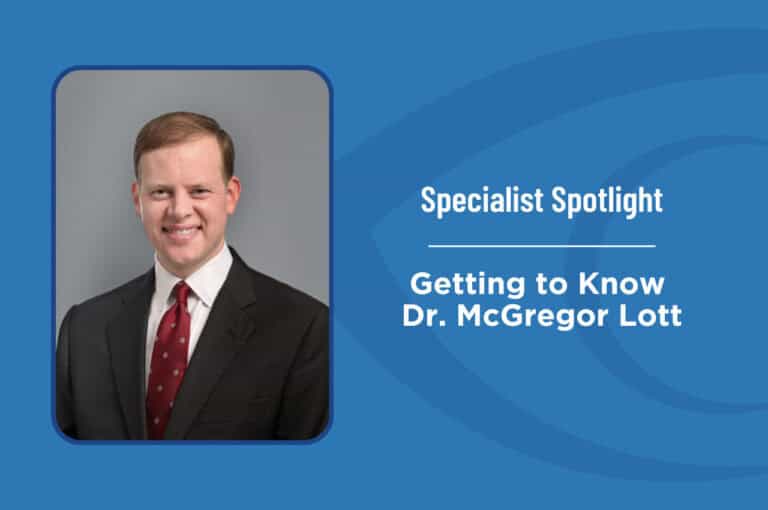At Florida Eye Specialists, we’re committed to providing quality care with the latest technology, from diagnosis to treatment. Dedicated doctors like McGregor Lott, M.D. make our practice Jacksonville’s leader for comprehensive eye care and personalized patient treatments.
Dr. Lott is an award-winning ophthalmologist with nearly 19 years of experience in eye care. He joined Florida Eye Specialists in 2017 and has become known for his compassion, attention to detail, and willingness to educate patients on any eye care topic.
We sat down with Dr. Lott to learn more about his background, experience, and what it means to be a part of the team at Florida Eye Specialists.
Why did you join the Florida Eye Specialists team?
My family initially moved from South Georgia to Jacksonville to take my son for cancer treatments at Wolfson Children’s Hospital. While that was difficult, we quickly realized that Jacksonville is a great place to live. I wanted to join Florida Eye Specialists because of the fantastic group of doctors here, and because they allowed me to practice in all my fields of specialty. My son is now cancer free and we’re here to stay.
I want to convey my gratitude and pride in being a part of Florida Eye Specialists. It is truly a great group of doctors and staff, and patients are always put first. We do our best for people, and I am proud to be a part of it.
What drew you to the field of ophthalmology, and to medical retina specifically?
I had family in ophthalmology and loved my rotation in medical school. I liked the fact that this specialty has a mixture of both surgical and medical treatments, and that you can serve patients of all ages. Plus, eye patients really appreciate what you do for them because you’re helping them see better.
I specialized in medical retina to expand my scope of offerings to my patients. General ophthalmologists usually refer retina problems to specialists, but I wanted to offer that specialty service and help patients in-house. It was also an exciting time to be in the field, thanks to new advances in treatments.
What is the most rewarding part of your job?
I really enjoy teaching my patients. I like helping them understand why we are doing what we’re doing with their treatment plans and answering their questions. Educating patients can take a lot of time, but it is really rewarding. I also love the special moment when a patient comes in after cataract surgery and they can see significantly better. If my patients are happy and satisfied, then I am too.
What is “Your Reason Why” you do what you do?
Around ten years ago, I saw an emergency patient who had been in a bad car accident, damaging his eyes and face. He could barely see anything and was terrified he would never see his three-year-old daughter again. It took three hours, but I performed a successful eye surgery to preserve his sight.
A year later, with all the sutures out, the patient could see 20/40 in both of his eyes without glasses. He was so grateful that he could still see to work, but most of all that he could see his little girl. That experience has always stood out to me as to why I work in eye care. Our vision is truly priceless.
What is your approach to patient care?
I take a very patient-centered approach to care, and I love to hear feedback from patients along the way. I personalize every visit because while some patients may need more direction, others want to hear all their options and be deeply involved in the decision-making process of their treatment.
I’ve learned that patients who agree with their treatment plan are more compliant and positive about it. That’s why I don’t like to just tell patients what to do. I like to have more interaction and conversation with my patients to make sure that all their concerns are addressed and their needs are met.
Looking to the future, what new treatment advancements are you most excited about?
Specifically for retinal disease, I think we’re going to see new medications that are longer lasting. This way, we can perform treatment injections less frequently and patients won’t need to come in the office as often.
We’ll also likely have new medications for dry macular degeneration, a disease that has long gone without many effective treatments. The new drugs that are currently in FDA approval could be game changers.
When not working, what are your hobbies and how do you like to spend your time?
I have a great wife and two great kids. I love spending time with them, doing things together as a family and traveling. We love living in the Riverside area and enjoy the shops and restaurants. In my free time, I also enjoy reading and listening to music.
